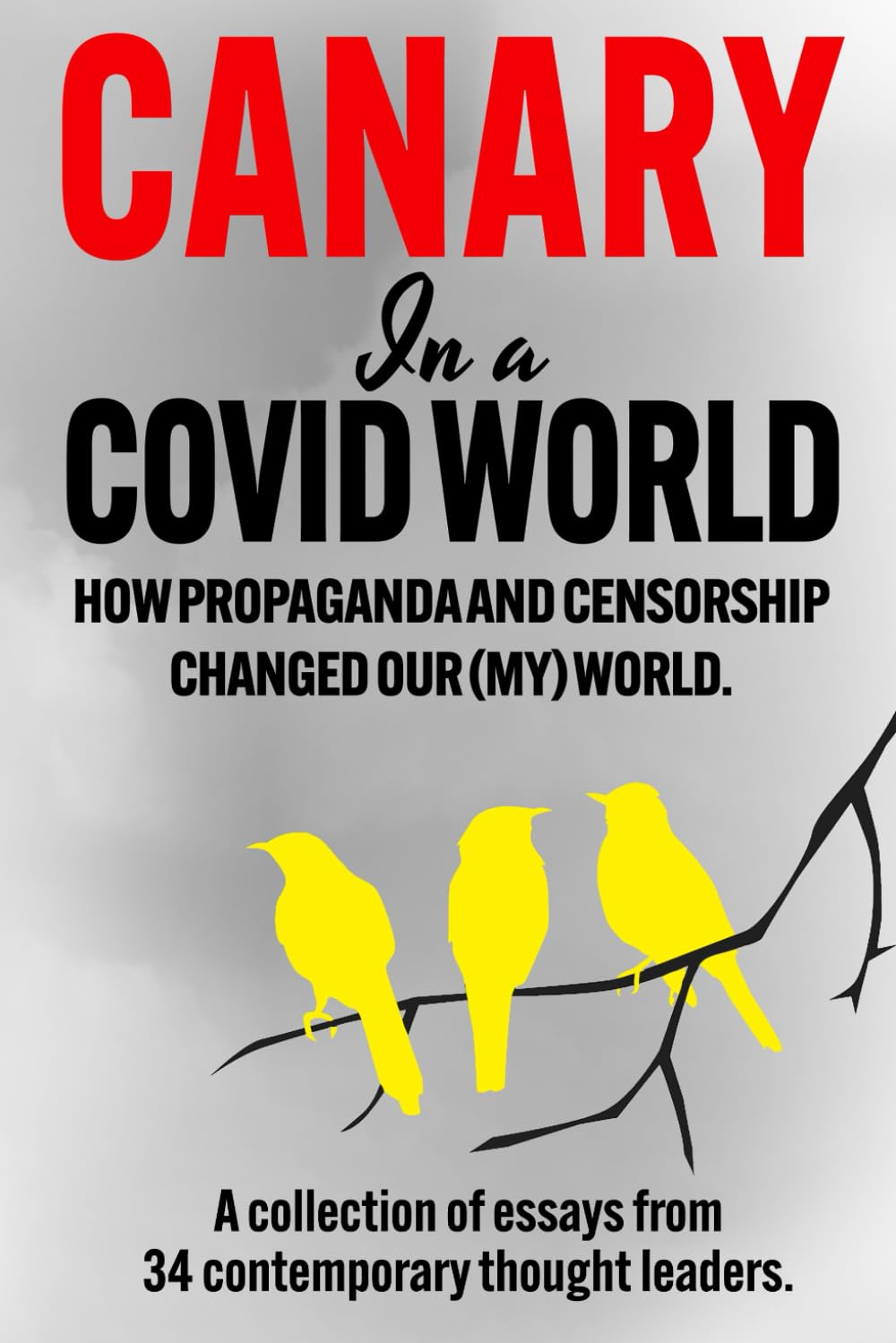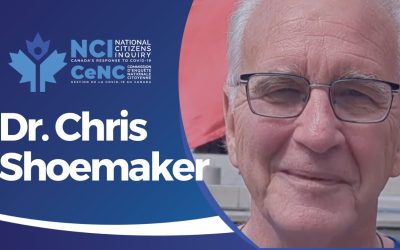The Frontier Centre for Public Policy recently held a symposium reviewing and important new book CANARY in a COVID WORLD: How Propaganda and Censorship Changed our (my) World, edited by C. H. Klotz (Canary House Publishing, 2023).
The COVID pandemic hit North America with disastrous consequences for both the health care systems and the civil liberties of individuals. The book focuses on these issues in the U.S., but there are several chapters written by Canadians showing that the Canadian situation was very similar to that in the U.S.. Public policy fellows and writers at the Frontier Centre, Leighton Grey, Marco Navarro-Genie, and Rodney Clifton and Sophia Leis, share their thoughts here on CANARY in a COVID WORLD.
These reviewers recognize the book’s importance in exposing the transgressions that occurred in both the U.S. and Canada, from forced masking, restricted travel, and virtually forced vaccinations. This book was written to ensure that these damaging policies never happen again. The authors are hopeful, but there is no assurance the transgressions will not be repeated.
CANARY in a COVID WORLD will be of interest to Canadians who are concerned about the dysfunctional way our country dealt with the COVID pandemic. Canadians may want to buy the book after reading these reviews.
Read:
Read: Lies My Gov’t Told Me: And The Better Future Coming by Robert W. Malone
Read: The Courage to Face COVID-19: by John Leake and Peter A. McCullough
COVID-19 Policies Undermined Trust in Key Institutions
This book is a compilation of 34 essays covering the many afflictions freed by the policy response to COVID-19. The response was inconsistent, contradictory, unscientific, partisan, coercive, manipulative, and occasionally malicious. Many damaging consequences of these responses are not health-related and will linger long into the future. This faulty policy response encouraged the corruption of key human activities that are fundamental to the health of contemporary society. Such corruption was most palpable in science, medicine, journalism, and government.
The corruption in these fields had a damaging effect on public trust in civil and government institutions, and people’s trust in each other. Trust holds healthy human relations together and is a crucial ingredient for a free society. Rodney Palmer, a former Canadian journalist, defines it in Essay 17 of the book: Trust is the “assured reliance on the character, ability, strength or truth of someone or something” (211). But given the context, readers should keep in mind Thomas Hobbes’ concept of trust as the expectation that others will not harm you. For Hobbes (Leviathan, Ch. 13), civil society is not possible without trust.
First, the COVID-19 response perverted science in three intertwined but separate areas: medical research, pharma, and universities. The main perversion in medical research was its refusal to incorporate earlier knowledge about immunities, emergency protocols, and treatments of known coronaviruses, including SARS-COV-1. This led to the rejection of existing therapies, and instead, researchers embraced the novelty narrative, pretending SARS-CoV-2 was an unprecedented and mysterious pathogen.
Pharma expectedly failed by ignoring ethical rigour and established protocols, faking, and fabricating data, manipulating evidence, twisting language, threatening, and coercing conscientious employees, and putting profit ahead of human welfare. Exploiting the public trust deficit, pharmaceutical companies played and failed at being our saviour.
Pharma conveniently created an expectation that injectable products, as Dr Jessica Ross refers to the “jabs,” could deliver the world from lockdowns. Protecting that lie became the reason for bigger lies, to cheat and manipulate research, even long after there was ample evidence that the developed vaccines were neither safe nor effective. This went on long after they knew that their product was a vector of transmission and a source of devastating harm.
Because many of pharma’s members are scientific researchers, the academy had parallel and greater failures. Universities acted as cheerleaders, often forcing the vaccines on their students, faculty, and employees, silencing those who questioned or resisted, and in several circumstances, isolating and firing faculty. Administrators and trained social critics in philosophy, law, sociology, history, and political science perverted their professions when they either followed official discourse and coercive mandates or remained silent in the face of blatant violations of civil rights (239).
In some universities, bureaucrats were so vicious in their exercise of power that they caused significant and long-lasting harm. Without exception, the intimidation of faculty, suppression of academic freedoms, and the endorsement of injustices across Canadian universities corrupted their mission as entities of truthful inquiry.
As a second source, the medical community did its part to erode trust. Medical associations became servants of state power, not servants of public health (255). They became fierce enforcers of rules they knew were immoral. Individual doctors succumbed to the bullying of politicians, medical bureaucrats, and professional associations. With very few exceptions, doctors sacrificed patients for their careers and self-interest, in betrayal of their Hippocratic oaths. Physicians could have resisted the mass hysteria, the manipulations, and the lies pharma and governments peddled but chose not to do so. COVID-19 exposed the medical profession as ill-prepared: “Most doctors are not aware they…lack the necessary skills to evaluate the reliability and usefulness of medical science” (169). Their lack of caution and courage to protect patients significantly reduced trust in doctors.
Another corrupted activity impairing and diminishing trust in public institutions was the lack of ethics in mainstream journalism. Most legacy news outlets deliberately relinquished their duty to tell the truth, question things, and challenge lies, manipulations, abuses of authority, and the corruption of other societal activities like medical practices and government mishandling. The dishonesty of the journalistic craft and the perversion of its mission are significantly responsible for the COVID-19 debacle.
Without a media committed to exposing the schemes, no scientist could challenge the exaggerated orthodoxies in policy, the fake pharma claims, and the corrupt medical bureaucrats. The media went beyond suppressing facts; it became a marketing tool for pharma. Even more concerning was its role as enforcers of the lies and manipulations of experts, governments, and medical bureaucrats.
And without wishing to elevate them to the noble aspirations journalism once had, Big Tech helped propagate false narratives. Big Tech crushed scientific inquiry and violated citizen rights by colluding with governments and pharma. They facilitated and encouraged the falsification of journalism as journalists betrayed their craft, betrayed citizens, and betrayed the democracy they were supposed to serve (79). Together, they became untrustworthy enforcers of officious truths and harmed careers and livelihoods, public health, and the democratic institution itself.
But there was no greater damage to public trust than that which was caused by elected officials. They left people voiceless, shutting down institutions when people most needed them open. Governments betrayed the confidence of their citizens, never to be enjoyed the same way again.
Governments lied, equivocated, manipulated, and turned people against one another. They punished unjustly, trampled rights and freedoms, spied on citizens, savaged the economy, and abused power. They exploited the trust of the people they represent, serve, and lead. Governments chose to play roulette with people’s lives, businesses, livelihoods, and the [mental] health, and the education of the young while neglecting those most vulnerable and susceptible to infections. Governments submitted to pharma interests and ulterior motives, and willingly relinquished their job to exercise prudent judgment to medical bureaucrats.
CANARY in a COVID WORLD focuses on “how propaganda and censorship” manipulated and amplified existing troubles in the culture. It is an eye-opening, worthwhile book peppered with data and interpretations one does not easily find in mainstream media. The editor has done an excellent job of aggregating these essays, often weaving together disjointed interviews into accessible prose. Contributors span various fields, including professors, injured citizens, scientists, researchers, doctors, journalists, and epidemiologists.
Despite the wide coverage, unfortunately, the salient COVID-19 political failures are not illustrated in this book. The COVID-19 event was an exercise in exploiting political power. The deployment of propaganda, the suppressed debates, and the manipulations are necessarily political. And yet, the book could have engaged more substantively the question of power than the discussion about the deep state.
While the pandemic policy debacle was not the start of citizenry distrust in the elected, it accelerated it. For decades social scientists have documented an erosion in submissiveness to authority in liberal democracies. Representatives do not trust citizens and citizens reciprocate that sentiment. Doubted, the elected transformed themselves into a manipulative elite, as the COVID-19 reactions show.
COVID initially acted as a rallying element (We are all in this together!) as fear pushed people into hastily trusting social and political institutions. Eventually, the outcomes disappointed and accelerated mistrust, even if there are still portions of the electorate still gripped in fear-induced trust in whatever governments have done.
The minuscule rate at which people voluntarily accepted COVID-19 injectables tells a partial tale. Few trust them. A lack of trust in scientists hurts science in the same way that a lack of trust in doctors hurts medicine and a lack of trust in journalists hurts journalism. Undermining trust in such institutions has significant consequences across other layers of society that go beyond the aberrations of the activities described in the book.
There is a degrading cycle when trust goes missing, one which should deeply concern us. With less trust comes less social cohesion, increased apathy, and diminishing respect for authority. These errors and manipulations have bred more suspicion, and less willingness to obey. Citizens will not trust those who have harmed them. The wide undermining of trust undermines the foundations of democratic society.
To return to Hobbes, weakened trust erodes consent and consensus. When people do not trust those who occupy our media, health, legal, scientific, and educational institutions, they will resent their authority. And less consent requires more coercion, more laws, more regulations, more bureaucracy, and more enforcement. This is a volume as crucial to understanding what happened during COVID-19 as it is to understand what looms on the horizon.
Unless people act to redirect institutions into pathways they can trust, the worst result is the increased erosion of authority, more coercion, and greater loss of freedoms.
Marco Navarro-Génie is the founding president of the Haultain Research Institute. He is the author of hundreds of articles, several policy reports, and three books. His latest book, co-written with Barry Cooper, is Canada’s COVID: The Story of a Pandemic Moral Panic (2023).
Read: Review 1 of 3: A Canary In A Coal Mine Is A Warning Sign by Leighton Grey here.
Read: Review 3 of 3: There Was Not One, But Three Pandemics by Rodney Clifton and Sophia Leis here.



